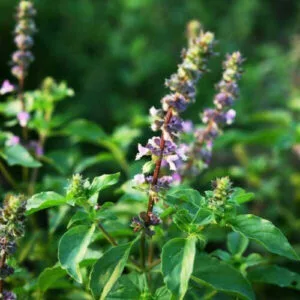Holi Basil / Tulsi Seeds (20 seeds)
₹35.0
Holy Basil is a traditional herb with lots of medicinal properties. It is essential in every home garden. They are known to be good mosquito repellent. Try our Non-GMO Holy Basil Seeds. Also, check out our workshops for more details.
PRODUCT DESCRIPTION
Number of seeds in a packet – 20
PLANT DESCRIPTION
- Difficulty Level – easy
- Plant Height – up to 2 feet
- Type – indoor (balcony/ terrace)
- Aroma – a strong aroma and an astringent
- Flavor – slightly bitter flavor
- Feed – Vermicompost for nutrients every week, Seaweed once a month for greener leaves, and Epsom Salt for better blooming once a month
- Watering – every day during summer and alternate days during winter
- Sunlight – full sunlight
- Germination Time – 1 – 2 weeks
- Repotting Time – after 6 – 7 weeks
- Suitable Temperature – 80°F – 90°F
- Season – annual
- Sowing – spring
HOW TO GROW HOLI BASIL/ TULSI FROM SEEDS
- Take a Seedling Tray and fill it with Cocopeat.
- Make a ½ inch deep hole and put 4 seeds in each hole.
- Fill the hole with Cocopeat and spray with water.
- Water every day during summer and alternate days during winter.
- Seeds will germinate within 14 days.
- Full sunlight is needed.
ALTERNATE METHOD
- Take a Medium Size Pot and add a Potting Mix.
- If planting in the soil add Neem Cake Powder, Vermicompost, and Seaweed.
ALTERNATE NAME
Botanical name: Ocimum tenuiflorum
holy basil/ tulsi seed in hindi: pavitr tulasee/tulasee ke beej (पवित्र तुलसी/तुलसी के बीज)
holy basil/ tulsi seed in tamil: punita tulaci/ tulaci vitai (புனித துளசி/ துளசி விதை)
holy basil/ tulsi seed in telugu: pavitra tulasi/ tulasi ginnja (పవిత్ర తులసి/ తులసి గింజ)
holy basil/ tulsi seed in kannada: pavitra tulasi/ tulasi bija (ಪವಿತ್ರ ತುಳಸಿ/ ತುಳಸಿ ಬೀಜ)
holy basil/ tulsi seed in marathi: pavitra tulasa/ tulaśice bija (पवित्र तुळस/ तुळशीचे बीज)
holy basil/ tulsi seed in malayalam: visudha thulasi/ thulasi vithu (വിശുദ്ധ തുളസി/ തുളസി വിത്ത്)
Other Name: Tulasi..
You must be logged in to post a review.
Q & A
The sustainability of organic herbal seeds depends on various factors, including the cultivation practices, seed sources, and environmental considerations. Here are some points to consider regarding the sustainability of organic herbal seeds:
Organic cultivation practices: Organic farming methods aim to promote sustainability by minimizing the use of synthetic pesticides, herbicides, and fertilizers. Organic herbal seed producers typically follow these practices, which contribute to the overall sustainability of the seeds.
Biodiversity preservation: Organic farming often emphasizes the preservation of biodiversity. By cultivating organic herbal seeds, farmers can support the growth and maintenance of diverse plant species, which can have positive ecological impacts and help preserve local ecosystems.
Non-GMO and heirloom varieties: Organic herbal seeds are typically non-genetically modified organisms (non-GMO) and may include heirloom varieties. Heirloom seeds are open-pollinated and have been passed down through generations, preserving their genetic diversity. This focus on non-GMO and heirloom varieties helps maintain genetic integrity and diversity in the plant kingdom.
Seed saving and sharing: Organic herbal seed producers often encourage the practice of saving and sharing seeds. This approach promotes self-sufficiency, reduces dependence on commercial seed sources, and fosters community engagement and resilience.
Local and regional adaptation: Organic herbal seeds are often sourced and produced locally or regionally. This focus on local adaptation can support the growth of plant varieties that are well-suited to specific climates and conditions, reducing the need for extensive inputs and resources.
Soil health and fertility: Organic farming practices, including those used for herbal seed production, prioritize soil health and fertility. By avoiding synthetic chemicals and promoting natural soil amendments and organic matter, organic farmers can enhance soil quality and ensure the long-term sustainability of their cultivation practices.
Environmental impact: Organic farming methods generally have a lower environmental impact compared to conventional farming. By reducing the use of synthetic chemicals and promoting sustainable practices, organic herbal seed production can contribute to the conservation of water, biodiversity, and overall ecosystem health.
It's important to note that the sustainability of organic herbal seeds also depends on the individual practices of seed producers. When sourcing organic herbal seeds, it's advisable to look for certifications from recognized organic certification bodies to ensure that the seeds meet specific organic standards.
General Inquiries
There are no inquiries yet.



















Reviews
There are no reviews yet.